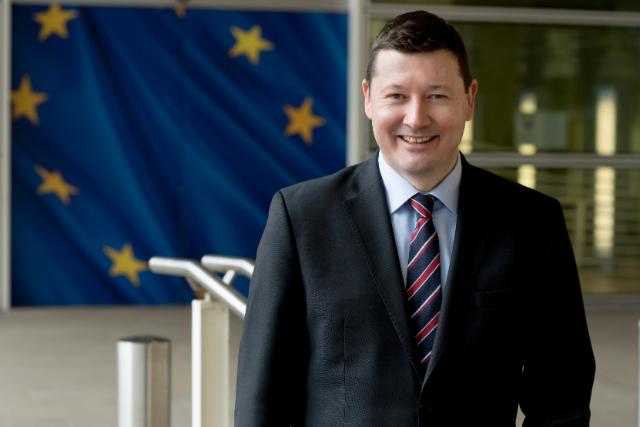Die kürzlich erfolgte Ernennung von Martin Selmayr zum Generalsekretär der Europäischen Kommission wird die Abgeordneten des Europäischen Parlaments in der heutigen Aussprache auf Initiative der Grünen/EFA-Fraktion beschäftigen. Die Grünen haben außerdem einen Fünf-Punkte-Plan dazu vorgelegt (siehe unten). Gleichzeitig nähren heimliche Treffen des ehemaligen EU-Kommissionspräsidenten und heutigen Goldman Sachs-Vorstands José Manuel Barroso mit EU-Kommissar Jyrki Katainen den Verdacht auf Interessenkonflikte, die Aufstockung des großzügigen Gehalts von EU-Kommissar Miguel Arias Canete ist ethisch bedenklich. Sven Giegold, Berichterstatter des Europaparlaments für “Transparenz, Integrität und Rechenschaftspflicht der EU-Institutionen”, fordert die Entlastung des Haushalts der Europäischen Kommission zu verschieben:
“Posten in europäischen Institutionen müssen nach der besten Qualifikation, nicht nach den besten Kontakten vergeben werden. Es geht nicht um die Person Selmayr, sondern das Beförderungsverfahren von Selmayr. Postenvergaben in Nacht- und Nebelaktionen erwecken den Verdacht von Vetternwirtschaft. Europa macht sich mit der Blitzbeförderung von Selmayr gegenüber Populisten angreifbar. Positionen in allen EU-Institutionen müssen offen ausgeschrieben werden. Für Spitzenpositionen darf es keine Ausnahmen geben. Im Gegenteil: Gerade Spitzenämter müssen transparent und nach bester Eignung besetzt werden, denn sie spielen eine besondere öffentliche und politische Rolle.
Bis die Unklarheiten um Selmayrs Beförderung geklärt sind, muss das Europäische Parlament die Entlastung des Haushalts der EU-Kommission auf Eis legen. Die Affäre um die Ernennung von Selmayr reiht sich ein in eine Kette zweifelhafter Lobbytreffen und Bezüge. EU-Kommissionspräsident Jean-Claude Juncker muss glaubhafte Vorschläge vorlegen, wie er die Zweifel an der Integrität der Europäischen Kommission ausräumen will. Die EU-Kommission muss schnell handeln, eine Verschleppung der Ungereimtheiten wäre Wahlkampfhilfe für die EU-Skeptiker für den Europawahlkampf im kommenden Jahr.“
Die Plenardebatte zur Ernennung von Martin Selmayr können Sie heute ab ca. 17.15 Uhr hier verfolgen: http://www.europarl.europa.eu/ep-live/de/plenary
Die 5 Punkte sind hier online:
https://sven-giegold.de/2018/selmayr-green-five-point-plan/
———–
5 Green demands in view of the Selmayr case
by Sven Giegold (Spokesperson of the German Greens in the European Parliament)
and Bart Staes (Green coordinator in CONT)
On 21 February, the college of Commissioners appointed Mr Martin Selmayr as deputy secretary general. To the surprise of the vast majority of the college, Alexander Italianer resigned. Within minutes, secondly, the college appointed Selmayr as Secretary General to fill the sudden vacancy. The press spokespersons of Commission do not refute that Jean-Claude Juncker know Alexander Italiener’s intention to resign 2,5 years in advance, Selmayr at least since Christmas, and Günter Oettinger at least since the day before. The other 26 Commissioners were not aware of the intentions in advance. In the case of Mr Selmayr’s second appointment to Secretary General, the urgency, therefore, was deliberately created by the Commission President Jean-Claude Juncker.
The Greens defend the European Democracy and integrity of our EU institutions. EU Commission and European Parliament are already more transparent and have better integrity rules than many national institutions of Member States. And so far, the procedure to appoint Mr Selmayr was not found to violate any rules, as many rules exempt the highest ranks from using usual procedures. The highly unusual procedure in this case threatens to negatively effect the integrity of procedures in EU institutions. If such threat is possible within the rules, we have to change our rules. Staff regulations for EU officials, decided by Parliament and Council on the proposal of Commission, have to follow the principles of EU treaties. The principles of transparency, of equal access to positions and the collective responsibility of the college of Commissioners should be fully realised by staff regulations. Lessons learned from the Selmayr case should inform a necessary update. The position of Secretary General is of particular importance. The secretariat general draws up the Commission’s work programme, coordinates the reviews of impact assessments for proposed legislation, looks after the Commission’s transparency register and it polices the code of conduct for commissioners. Therefore, a Secretary General’s reputation should always be beyond any doubt.
We ask for a five point plan:
- The appointment of Martin Selmayr, both as deputy secretary general and secretary general of Commission needs full scrutiny by the European Parliament by those competent, especially the Budget Control Committee (CONT) to verify if present rules were correctly applied.
- Open tenders for positions should become the norm in all levels of EU institutions, exceptions for highest ranks have to be deleted from the rules, i.e. Article 29(2) regulation 31 (EEC), 11 (EAEC) laying down the Staff Regulations of Officials. Selection and appointment of Directors-General or their equivalent in grade AD 16 or AD 15 and Directors or their equivalent in grade AD 15 or AD 14 should follow the same procedures as all other EU officials. Before starting this long process, Commission should already decide not to use these exceptions any more. Commissions budget plan of 2018 includes 24 posts AD 16, 190 posts AD 15 plus 22 temporary posts and 637 posts AD 14 plus 31 temporary posts.
- Decisions on staff by the college of Commissioners should be known by all Commissioners at least one week in advance.
- Proper and transparent selection procedures should also apply in the European Parliament, Council and all EU institutions and bodies. Equally, those instutions should commit as soon as possible not to use exceptions of Article 29(2) regulation 31 anymore. Also inside the European Parliament, staff selection needs improved transparency and openness.
- Until the case is resolved, the discharge of Commission’s budget should be postponed from the Plenary in April to a later date (probably October) that allows for scrutiny of all documents that allow Parliament to fully understand.

